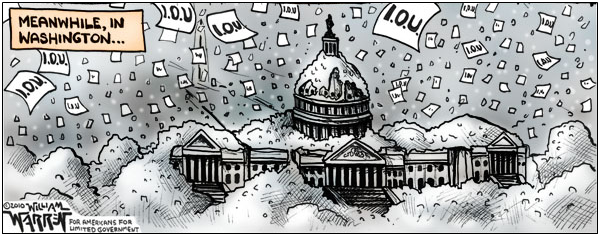The Congressional Budget Office estimates that the now-ended, month-long partial government shutdown cost the U.S. economy $3 billion of output in the fourth quarter of 2018, and $8 billion of output in the first quarter of 2019, respectively.
It doesn’t matter.
Of the amounts suggested, most of that comes out of $245 million of government contracts a day not paid out during the shutdown. Federal employees who were furloughed during that time have already been awarded back pay, including for the last week of 2018, the output of which has been moved into the first quarter of 2019.
Making no mistake, $8 billion in the first quarter works out to $32 billion annualized. That could take 0.6 percent out of the first quarter GDP’s inflation-adjusted growth rate.
But in terms of growth, it will be made up for in the second quarter and beyond as government contractor spending “grows” by $8 billion back to its normal level. As the report notes, “In subsequent quarters, GDP will be temporarily higher than it would have been in the absence of a shutdown.”
In other words, it’s a wash for the most part.
In addition, about $8 billion out of the $11 billion of lost spending will overall be pushed forward and simply spent later. According to the report, “Although most of the real GDP lost during the fourth quarter of 2018 and the first quarter of 2019 will eventually be recovered, CBO estimates that about $3 billion will not be.”
Meaning the real calculation that should be made is to the annual, inflation-adjusted growth rate. There, the $3 billion for the year is just a fraction, just 0.014 percent off the annual rate. Meaning, if growth would have otherwise been 2.6 percent, it would be reduced to 2.586 percent. It’s less than a rounding error.
It is true that government spending is factored into the overall GDP. What this underscores however is how temporary gains and losses to that figure really are.
So, if you know cutting spending would save money over the long run but one impact would be to output measured by the Bureau of Economic Analysis to the quarterly GDP, you take that deal because of the long-term benefits to reducing the deficit.
In other words, we do not make public policy decisions solely on how they impact quarterly GDP. Nor should we. Congress should still address budgets on their merits, including whether it meets the nation’s priorities, even if it takes a little while longer to come to a consensus or there’s a temporary shutdown. It’s not, hurry up and make a deal. Get it right.
Robert Romano is the Vice President of Public Policy at Americans for Limited Government.








